
“The development architecture should include all levels of government, including the local level. Also mutual accountability between all levels of governance is crucial”. This is what Mayor Celestine Ketcha Courtès said in her role as reporter during the Mutual Accountability workshop of the first High-Level Symposium in Korea with the theme: “Development cooperation for people and planet: what will it take?”. The symposium, which takes place from 8 to 10 April in Incheon, Korea, is part of the preparatory meetings in support of the 2016 United Nations Development Cooperation Forum (UN DCF).
UCLG Champion Ketcha Courtès stresses that local governments have a special role to play in development cooperation. The priorities of local governments are not always included in (inter)national priorities and their role in development is often overlooked, even though “to reach out to people, and especially the poorest, it is crucial to reach out to local authorities and not only use country-level means of implementation and national Official Development Assistance”. Ms. Ketcha Courtès sees it as her task to feed lessons from her local reality into international discussions on making development cooperation more effective, coherent and accountable.
The UN DCF is the main universal structure to discuss development cooperation policies. UCLG, as the global representation of local and regional governments, has been a member of the UN DCF Advisory Board as from its inception. The CIB Working Group has been supporting the participation of the UCLG Champions on Development Cooperation in various DCF meetings.
During the symposium, Mayor Ketcha Courtès will stress the fact that sharing challenges and experiences can be a highly effective way to enhance mutual learning, strengthening of capacities and thus contribute to the development process. Decentralized development cooperation has in many cases contributed to creating an enabling environment for strong local governance, enhancing trust of and accountability to citizens, civil society and the private sector.
Furthermore, it will be emphasized that strengthening of local governments is crucial to achieve the development goals. A top-down approach can result in development policies which are ill-adapted to local needs and contexts. Therefore the role of local governments as development actors should be reflected in the Sustainable Development Goals (SDGs) that should include a strong governance perspective, to increase public participation in political processes, to include participatory processes in decision-making, and to commit to transparent monitoring. Local governments should be involved directly and systematically in all stages of the development process, from the design and implementation of policies to the monitoring and evaluation, thus responding to the needs of citizens at the local level. It is crucial that they become true partners for the implementation of the future development goals.










